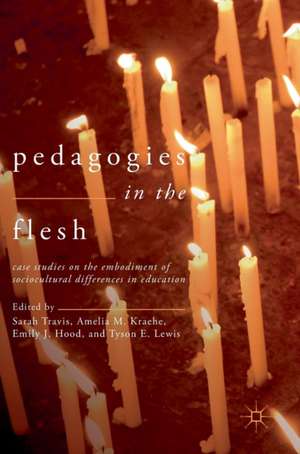Pedagogies in the Flesh: Case Studies on the Embodiment of Sociocultural Differences in Education
Editat de Sarah Travis, Amelia M. Kraehe, Emily J. Hood, Tyson E. Lewisen Limba Engleză Hardback – 20 sep 2017
| Toate formatele și edițiile | Preț | Express |
|---|---|---|
| Paperback (1) | 212.66 lei 6-8 săpt. | |
| Springer International Publishing – 22 iun 2018 | 212.66 lei 6-8 săpt. | |
| Hardback (1) | 782.24 lei 6-8 săpt. | |
| Springer International Publishing – 20 sep 2017 | 782.24 lei 6-8 săpt. |
Preț: 782.24 lei
Preț vechi: 953.96 lei
-18% Nou
Puncte Express: 1173
Preț estimativ în valută:
149.70€ • 155.71$ • 123.59£
149.70€ • 155.71$ • 123.59£
Carte tipărită la comandă
Livrare economică 15-29 aprilie
Preluare comenzi: 021 569.72.76
Specificații
ISBN-13: 9783319595986
ISBN-10: 3319595989
Pagini: 219
Ilustrații: XXV, 220 p. 2 illus. in color.
Dimensiuni: 148 x 210 mm
Greutate: 0.45 kg
Ediția:1st ed. 2018
Editura: Springer International Publishing
Colecția Palgrave Macmillan
Locul publicării:Cham, Switzerland
ISBN-10: 3319595989
Pagini: 219
Ilustrații: XXV, 220 p. 2 illus. in color.
Dimensiuni: 148 x 210 mm
Greutate: 0.45 kg
Ediția:1st ed. 2018
Editura: Springer International Publishing
Colecția Palgrave Macmillan
Locul publicării:Cham, Switzerland
Cuprins
Chapter 1. Introduction.- Chapter 2. When Bodies Require Trigger Warnings.- Chapter 3.The Embodied Harm of Stereotype Threat.- Chapter 4. Grieving with Rage.- Chapter 5. Feeling Pedagogy: Parenting and Educating in the Flesh.- Chapter 6. Tears at the Eye Doctor.- Chapter 7. The Color of Crayons: A Preschooler’s Exploration of Race and Difference.- Chapter 8. Which Way Did He Go, George?: A Phenomenology of Public Bathroom Use.- Chapter 9. Feeling the Sting of Being a Tattooed Mother in the Public Eye.- Chapter 10. Black Counter-Gazes in a White Room.- Chapter 11. But I Had Windows.- Chapter 12. Clutching the Vacuum.- Chapter 13. The Haze.- Chapter 14. He’s Wearing a Dress.- Chapter 15. (Dis)orienting Laughter.- Chapter 16. Getting Down, Feeling White? The Pedagogy of the Internet for Dancing Race.- Chapter 17. Unheimlichkeit: Recollections of the Gaze.- Chapter 18. Crossing the Chiasm; Sutured Care in Medical Education.- Chapter 19. Compulsory Heterosexuality and the Queering of Southern Lines.- Chapter 20. Literature, The White Gaze, and the Possibility of Conversation.- Chapter 21. Stumbling.- Chapter 22. “So, are you a feminist epistemologist?”: Holistic Pedagogy for Conversations on Indigeneity, Love, and Crossing Borders.- Chapter 23. Learning to Use the Switch.- Chapter 24. Adjusting One’s Self: An Educator’s Experience in a Peruvian Community.- Chapter 25. The Myth that Brands.- Chapter 26. Hairpulling in the Art Room: A Phenomenology of Un/marked Bodies.- Chapter 27. They Put It in the Yearbook, but with a Smiling White Kid: Encoding the Weakness of Children and Native Americans, and the Whitewashing of the Message.- Chapter 28. The Ugly and Violent Removal of the Cecil Rhodes Statue at a South African University: A Critical Posthumanist Reading.- Chapter 29. Sirens of Remembrance.- Chapter 30. Black Body Being-in-Weirdness in the Academy.- Chapter 31. Activism and Love: Loving White People through the Struggle.- Chapter 32. Splash Violence and Other-than-human Bodies as Sites of Power, Resistance, and Pedagogical Possibility.- Chapter 33. Praxis.
Notă biografică
Sarah Travis is a PhD candidate in Art Education at the University of North Texas, USA.
Amelia M. Kraehe is Assistant Professor of Art Education at the University of North Texas, USA.
Emily J. Hood is a PhD student in Art Education at the University of North Texas, USA.
Tyson E. Lewis is Associate Professor of Art Education at the University of North Texas, USA.
Amelia M. Kraehe is Assistant Professor of Art Education at the University of North Texas, USA.
Emily J. Hood is a PhD student in Art Education at the University of North Texas, USA.
Tyson E. Lewis is Associate Professor of Art Education at the University of North Texas, USA.
Textul de pe ultima copertă
This book presents a collection of vivid, theoretically informed descriptions of flashpoints––educational moments when the implicit sociocultural knowledge carried in the body becomes a salient feature of experience. The flashpoints will ignite critical reflection and dialogue about the formation of the self, identity, and social inequality on the level of the preconscious body.
Caracteristici
Explores the pedagogical moments or “flashpoints” when sociocultural formations of difference and power take hold through the corporeal capacities of the knowing body Features concisely written accounts of flashpoints that attend to the somatic intensities of the flesh as a site of knowledge, resistance, and transformation Contributors range from a number of disciplines including philosophy, sociology, women’s studies, and education Presents rich phenomenologically informed case studies of educational encounters within difference, and demonstrates description as a method for thinking about critical incidents of teaching and learning
